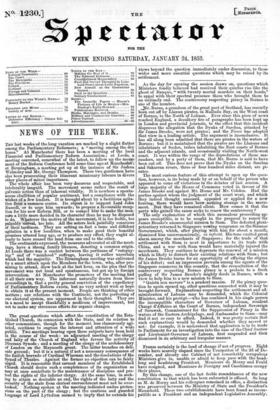As the day for opening the session draws on, questions
which Ministers fondly believed had received their quietus rise like the ghost of Banque, "with twenty mortal murders on their heads," to appal with their spectral presence those who brought them io an untimely end. The controversy respecting piracy in Borneo is
one of the number. .
Jr. Burns, a grandson of the great poet of Scotland, has recently been eat off by Llanun pirates, in Malludu Bay, on the West coast of Borneo, to the North of Labuan. Ever since this piece of news reached England, a desultory fire of paragraphs has been kept up in London and provincial journals, to the effect that this incident disproves the allegation that the Dyaks of Sarebas, attacked by Sir James Brooke were not pirates; and the Times has adopted that view in a lending article. The argument is inconclusive. It has all along been admitted that there are pirates in the waters of Borneo; but it is maintained that the pirates are the Llanuns and inhabitants of Sooloo tribes inhabiting the East coasts of Borneo and the adjacent islands, and occasionally visiting the North-west
coast. It was within theof the depredations those ma- rauders, and by a party of them, ns that M.. Burns is said to have
been cut off. This does not prove that the Dyaks on the Sambas and Sakarran rivers, three or four hundred miles distant, are pi- rates.
The most curious feature of this attempt to open up the ques- tion, however, is its being made by or on behalf of the person who appeared to come off victorious in the debates of last session. A large majority of the House of Commons voted in favour of Sir James Brooke and against M. Hume and Mr. Cobden. Had the parties against whom the judgment of the court went, and which they indeed thought unsound, appealed or applied for a new hearing, there would have been nothing strange in the move- ment But they have remained silent. How comes it that the party who gained the cause seeks to renew the controversy.?
The only explanation of which this anomalous proceeding ap- pears susceptible, is to be sought in the proposal to renew Sir James Brooke's unsuccessful mission to Siam. The defeated pleni- potentiary returned to Singapore vowing vengeance on the Siamese
verament, which, after playing with him for about a month, dismissed him unceremoniously, re infeetii. His tone excited great alarm among the merchants of Singapore; for the trade of that settlement with Siam is next in importance to its trade with China, and a war with Siam would have materially injured the merchants. They continue to deprecate the renewal of a mission which is likely to disturb their existing relations with Siam ; but Sir Tames Brooke bfirns for an opportunity of effacing the stigma of his defeat; and an impression prevails among the agents of the Singapore Commerce in this country, that the resuscitation of the controversy respecting Borneo piracy is a prelude to a fresh puffing of Sir James Brooke's mighty deeds in Borneo, with a view to help him to a new mission to Siam.
" Quiete non movere" is a prudent maxim. If the piracy ques- tion be again opened up, other questions connected with it may be brought forward. Explanations respecting the settlement and ad- ministration of Labuan may be demanded, which the Colonial Minister, and his protégé—who has combined in his single person the incompatible characters of Governor of Labuan, resident Chargé d'Affaires at the Court of Borneo, independent Sovereign of Sarawak, Commissioner for the Suppression of Piracy in the waters of the Eastern Archipelago, and Ambassador to Siam—may find it not so easy to afford. Indeed, it was pretty certain that such explanations would be demanded whether they moved or not: for example, it is understood that application is to be made to Parliameis t for an investigation into the case of the Chief Justice
t and Lieutent t-Governor of Labuan, first suspended and then a
dismissed in arbitrary and irregular manner.


























